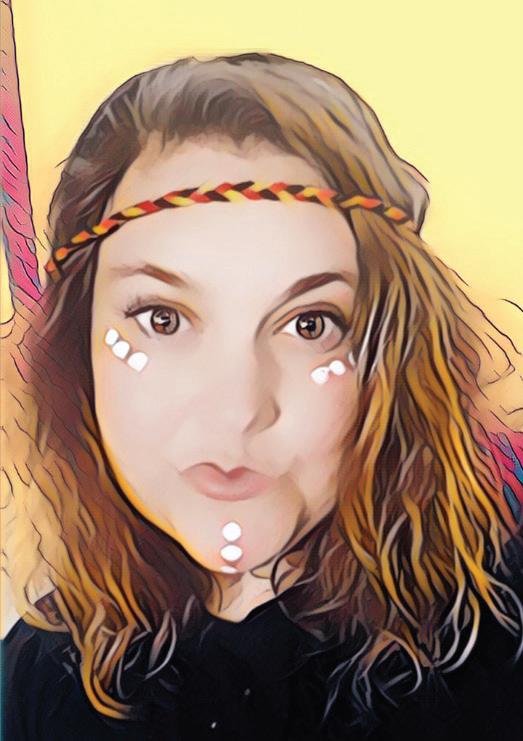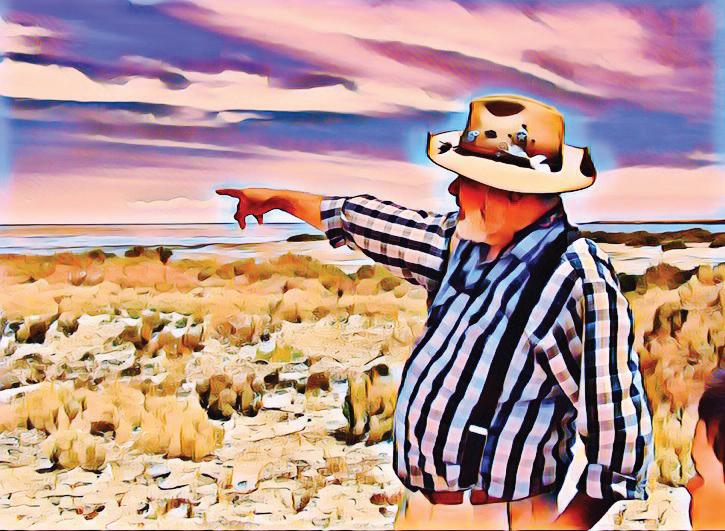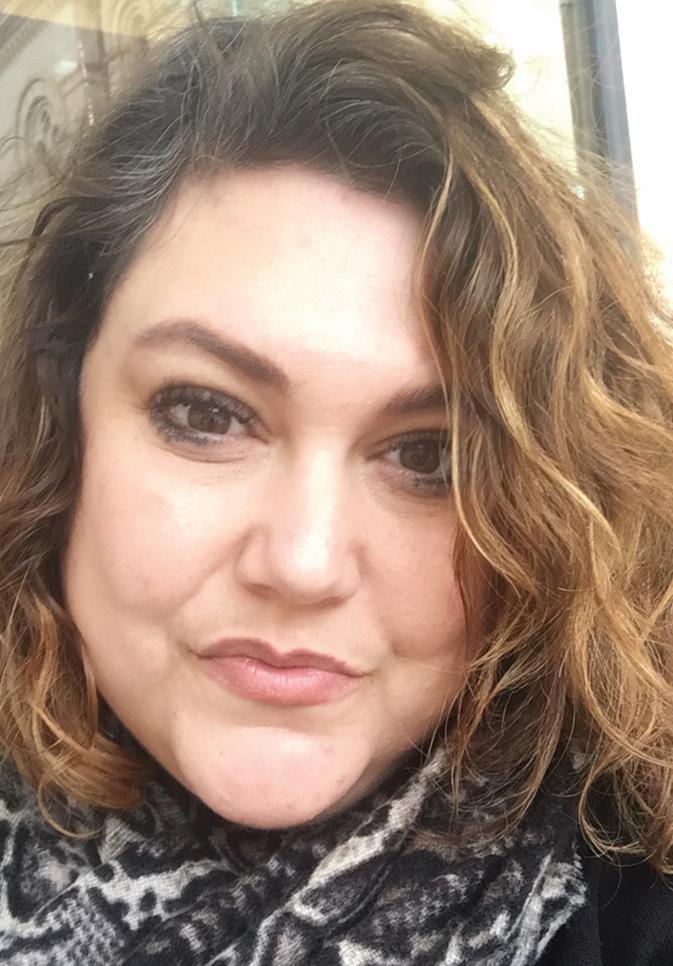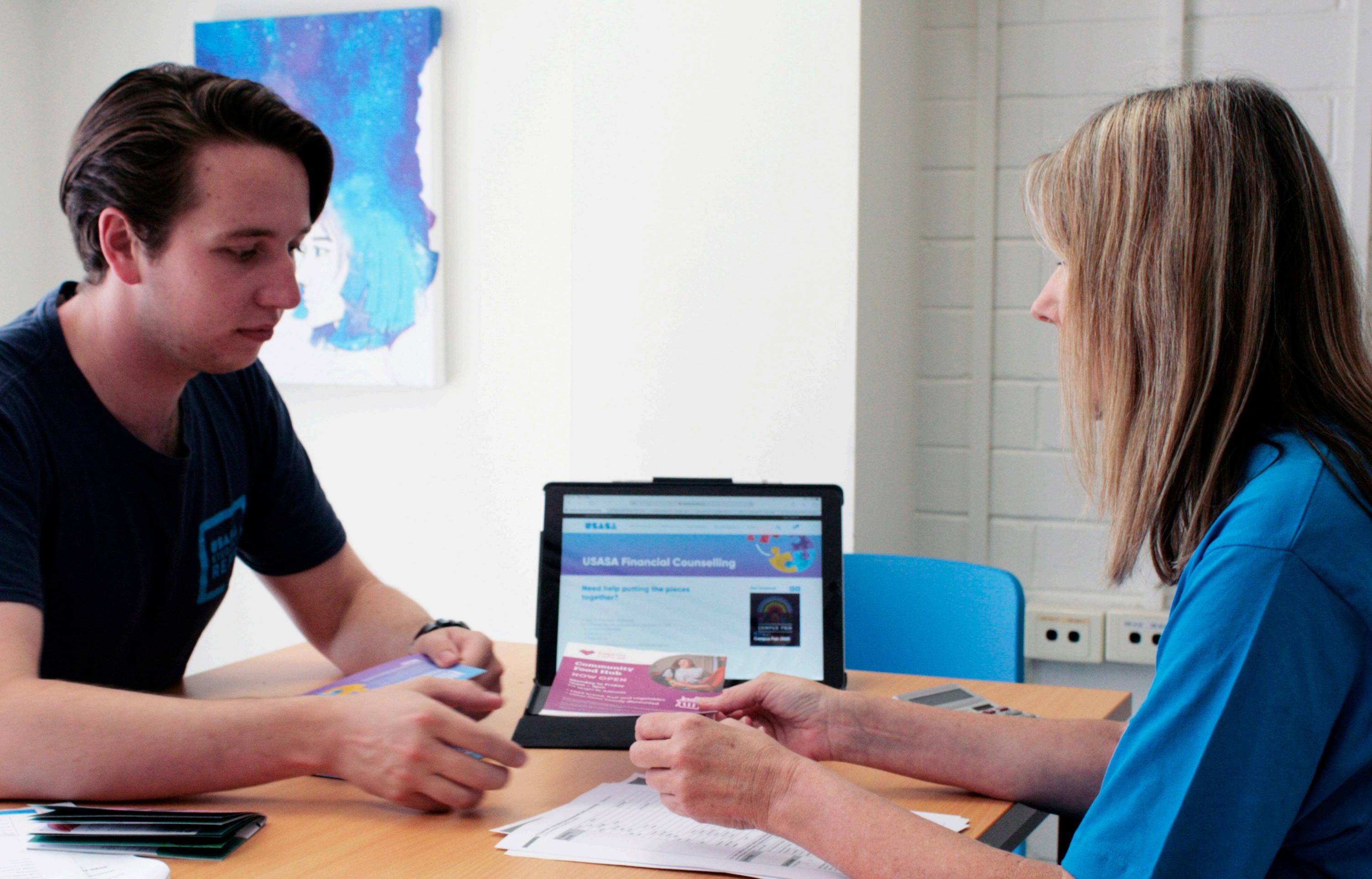
13 minute read
Interview: Tabitha Lean
Interview Anna Day Artwork Tabitha Lean
Verse sat down with Tabitha Lean. Tabitha is Gunditjmara through her mother’s bloodline, and was born and raised on Kaurna country. She is an artist, writer, and activist. She’s also the guest Head Editor of Verse’s Blak Out edition, which comes out in September. Currently completing her Masters in Aboriginal Studies, Tabitha hopes to use her studies to raise awareness of this nation’s brutal, violent and often lethal criminal justice system. Tabitha puts it best when she says she’s passionate about “decolonising institutions, and what that process looks like, and how we can advance the process of blackening up white spaces.”
Tabitha Lean
Have you always been connected to your Aboriginal heritage? Can you tell us about it?
Can you share an insight into what engaging with your cultural knowledge and spirituality is like?
Actually my Mum died when I was a little baby so I was raised by my father who is not Aboriginal. This meant I had a bit of a disconnect with my own community while I was growing up, especially being raised away from country. However, with the help of some aunties involved in the grannies group I was able to make some connections with my own heritage and to connect with family, and learn from so many amazing knowledge keepers. It just happened that the grannies group in Kaurna country was actually going over to Victoria to meet with the Victorian grannies group which was comprised of Gunditjmara elders. I mentioned to one of the grandmothers, who is one of my aunties, ‘You know, my mob come from there. I’ve been estranged from my mother’s family and I don’t really have good connections with the community there. Could you just ask around?’ My aunty came back and she had all these contacts for me of people that I was related to that I hadn’t had contact with and so I contacted one of the women and she had done the entire family tree. So I was able to situate myself and my mother in that broader family. It was a bit of a turning point for me because I, all of sudden, felt more connected to the family there. I’d always had Aboriginal family here and my kids’ father’s family here. I feel really lucky to have spent a lot of time with his community learning his language, songs and dances but I think I needed to connect with who my family was and all the knowledge keepers in my language group. It was special and I will forever be grateful for that aunty for making that connection.
I think it’s many and varied and hard to articulate. I think sometimes I struggle to articulate our beliefs or our spirituality in words so I’ll often paint. It seems weird for someone who likes writing for words to fail them at times but it does. I have one particular aunty that lives in Adelaide who teaches me all of our old ways, and shares so much of her knowledge and spirituality with me, I am truly grateful. She’s connected to the ancestors, she’s a healer so she provides physical and spiritual healing. Also, she’s wise in that she knows when you need something or when you need caring for or what might be the right fix. So recently, I’ve been struggling with being at home all the time and trying to manage all the things I’ve got going on and she just sent me a message out of the blue—I hadn’t even expressed to her how frustrated or anxious I was about everything—and said, ‘You know, what you really need to do is walk down to the park and gather up some eucalyptus leaves and do a eucalyptus cleanse’ and it’s like she just knows the right thing at the right time. Because I had learnt from her how to do this , I was able to do that with the kids. It’s a spiritual process in that when we collect the eucalyptus leaves—because obviously we can’t go onto country because I’m away from my country and the kids’ country is too far away as well in times of COVID— and so we went down the park and took our shoes off and put our feet in the earth and collected the leaves. In the process of collecting them, being really mindful that mother country is supplying these resources to us and this care is available right around us. So, we gathered up the leaves and brought them home and there was this process of the kids and I sitting around the table sorting them all out. We created these bundles and inside them is wattle and other native leaves and flowers. We did a cleanse through the house where my daughter sang a song in Ngarrindjeri, which is used to cleanse the dancing ground before performing. So, she did that around the house and then once the eucalypt bundles have dried out we’ll set them alight and inhale the smoke allowing it to waft across our body.
Connecting to country and the traditional processes and practices like the eucalyptus cleanse, as an example, that we are disconnected from on a daily basis because we’re using computers and phones, so making space and time

The Verse Blak Out edition is scheduled to come out in September. Can you tell us about your role as guest Head Editor and how it’s coming along?
Why is a dedicated Aboriginal-led Verse edition so important?
Racism is a huge problem in Australia. How do you see it manifesting in a university setting and what can we do to fight it?
in your day to connect with those old ways is hugely valuable for us. It’s also important for me to pass those practices on to the kids.
In terms of my aunty, it’s also having access to the stories. If I’m going through something or struggling with something, sometimes she’ll just tell me a story about some aspect of creation, or ways of being and knowing. Through her telling the story I can start to apply those learnings, lessons and understandings to the situation I’m going through. So, I think sometimes when our old people share stories it’s not so much direct instruction but they will share knowledge and through the process of that sharing and retelling you can start to see how that relates to what you’re doing or needing at that time.
We are so excited to be coordinating this Aboriginal student take-over of Verse. We have a guest editorial team of talented Aboriginal students all with very unique and diverse talents. The edition is going to be a showcase of Aboriginal student excellence. So far we have had an excellent response from students, and will be featuring poetry, short stories, some interviews, a deadly blak playlist, some opinion pieces, photography, art – we’re hoping it’s going to be bigger and blacker and deadlier than ever!
I think the most exciting thing for me is getting to know so many other Aboriginal students and hearing about all of the amazing talent that makes up our community. I love that someone could be sitting next to their fellow student, and not even realise that they are also an accomplished artist, or published wordsmith, or have masses of experience in managing large scale public events. I mean we are such a diverse mob, and I really hope that this edition will showcase all of the varieties of talents we all have.
It’s really important that our students have spaces to share their knowledge, opinions, art, craft and experiences with a wide audience of interested people both within the Aboriginal student cohort and outside of it. Also, as an Aboriginal student, I am excited that this edition provides a decolonised and accessible space for students to express themselves and maybe disrupt some existing hegemonies!
Sometimes I wonder whether universities really aim to produce and develop free thinking or whether they exist just to churn out the next generation of capitalists or imperialists. From my personal perspective, I think racism manifests in the voices that are held up as experts in the academy. I think there is this perception and rhetoric by all kinds of colonial institutions that they value and promote Aboriginal voices and knowledges, but in actuality the voices they value and promote are those that are peer reviewed, accepted by them, and reach a certain level of academic benchmark that the academy sets as some arbitrary marker of success. So I’d like to see more of our knowledge keepers recognised by the academy, people like my Aunty Mina or Uncle Dookie, both have infinite wisdom and knowledge. I’d like to explore how we could centre knowledges such as theirs. I do think there is change, I’m just probably very impatient for that change because I continue to see all of our old people being battle weary from fighting the on-going assault of colonisation and spending years asking politely—and sometimes impolitely—to be included in spaces where we have been excluded, including major areas like the constitution. They have spent years and years fighting, and I get tired of seeing our old people die never realising many of these things that they’ve fought so hard for. The other thing I am very conscious of is institutions who in theory support reconciliation and commit
Do you think that disconnect between Aboriginal culture and Western culture is shifting?
You’re a very creative person. In your creative writing in particular, what are you inspired by?
Have you always wanted to be an author? Can you tell us about how you pursue your writing voice?
to an increasing Aboriginal enrolment, but are often reluctant to re-evaluate and recalibrate their systems, processes, expectations and pedagogy to provide safe and accessible spaces and places for Aboriginal people. That being said, I do think good work is being done in all kinds of areas, by some amazing and talented people.
I think there is a shift. I think a shift is happening because we are facing a global climate catastrophe, and we’ve now got disease that is literally stealing the breath from people’s lungs in the same way that we have done to our Mother country. We’re strangling her and extinguishing her breath and now she’s taking it from us. So I think there is an impetus for change and I think some willingness to consider other ways of knowing and doing. But I find that while there is an openness, it is still conditional. We just had the catastrophic fires and there was quite a bit of media coverage around traditional Aboriginal land management and the use of fire in preventing these sort of catastrophes from happening. But there is no engagement in a real way. So while there was some publication of our ways, we don’t see any real shift in government policy that redirects or recalibrates government priorities to more sustainable and traditional land management methods. So I see that there is a shift in acceptance of different ways but I’d like to see that in more tangible and sustained way.
Also, I think there is always going to be a chasm between us, because everything about us is different. From my perspective, everything we do is connected to country and to our obligations to country, including our waters and our skies and the cosmos. Even when I am producing art, I am telling stories about my obligation and relationship to country or about the gifts that I have been given from the ancestors. So I think we can even obtain and use knowledge in a different way. That’s not to say that we couldn’t come to a space of coexisting with mutual respect in a real reconciliatory manner.
I was really lucky to grow up in a creative family. My grandmother was a beautiful craft maker, and my dad is a painter. My dad taught me a lot about art and being creative. He was always super supportive and encouraging of any new thing I wanted to try. He took me to galleries and our house was filled with paintings, sketch books, and beautiful big art books of all the greats. But right now, my writing is my focus. I dabble in painting, but poetry is the thing I enjoy most. Sometimes, people think because I am Aboriginal I will only write about culture, politics, land, country—but I write about all sorts of things—love, grief, longing, life…and sometimes politics and culture. I just don’t like how often we get pigeon holed as Aboriginal people. A good friend of mine talks about this often – how as an Aboriginal visual artist people always expect to see her produce dot paintings!
I don’t think I ever wanted to be an author, but I have always written. I spent almost ten years working for members of parliament where I wrote speeches and briefings for them. But I have always felt peace when I was writing creatively. I think after writing for a job for a decade, I lost my passion for it. And then a couple of years ago all of the words returned. They used to bash about my mind like a biggest mob of yukuty in there, and then when I finally set them free and put pen to paper, and it set me free too. Sounds totally clichéd but writing is actually a really cathartic experience for me. Sometimes, I will publish under a different name if it is a piece I feel particularly vulnerable about, but I am feeling more and more comfortable with putting my truths out there. I was lucky recently to have a yarn with an amazing Aboriginal academic that I admire, Aileen Moreton-Robinson.
For our taboo column this edition, we’re talking about hoarding toilet paper and pasta, and the different ways people react in times of crisis. Do you have anything to say on this?
Prof Moreton-Robinson happened upon an article I had published and she messaged me saying that she felt that my words came straight from the ancestors. It was the biggest compliment because I do feel that I have my mother’s stories and the blood of all the women before me coursing through my veins. It is in their honour that I centre their unique knowledges, and privilege their voices and stories in all my work.
Ahhhh so many thoughts….but I guess it has highlighted for me how primal people’s responses are to these sorts of times—people hoarding pasta and toilet paper, and in the US buying up guns and ammo. I think it’s extraordinary. And I also think it’s a hugely selfish act, not to mention a massive sign of privilege, to be able to hoard any grocery items. But I guess for some people they feel the need to do something to keep themselves and their family safe. I do think the ubiquity of social media plays a role in all of this too—flooding people’s timelines with images of empty supermarket shelves fuels people’s sense of threat and urgency.
But I would also say that I am so sick of people saying these are ‘unprecedented times’ when there was actually another time that a ship came to shore bringing death and disease (just saying)… ☐

USASA Financial Counselling

Need help putting the pieces together?
A Financial Counsellor can help you to develop a budget, understand your finances better, assist in dealing with university debt management & provide access to food support.
To book an appointment visit USASA.sa.edu.au/FinancialCounselling










